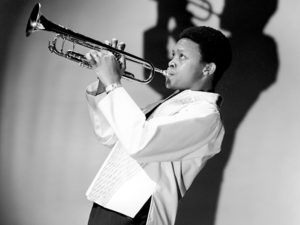Hugh Masekela died this week. The South African trumpeter had a big instrumental hit with “Grazing in the Grass” in 1968 and the Friends of Distinction followed-up the next year with a vocal version of Philemon Hou’s song and it was also a hit. But that one hit was hardly the whole story.
Masekela was born in a town called Witbank. Although he played piano as a child he found inspiration in a Kirk Douglas film called Young Man With a Horn (based on the life of jazz legend Bix Beiderbecke) and turned to the trumpet at the age of 14. Masekela attended St. Peter’s Secondary School where the chaplain was Archbishop Trevor Huddleston. Apartheid was the law of the land in those days but Huddleston was opposed to the system of segregation and repression. He gave Masekela his first trumpet and when Masekela identified other students who were interested in music they called their first band the Huddleston Jazz Band in recognition of his Huddleston’s support. There were several other bands along the way and in 1956 Masekela joined Alfred Herbert’s African Jazz Revue.
From an early age Masekela was determined to raise his voice in opposition to apartheid and his music was informed and inspired by the struggles and sorrows of black South Africans. And his was an effective voice, reaching those who were living under the boot of the apartheid rulers. In 1959, Masekela cast his lot with pianist Dollar Brand (who later became Abdullah Ibrahim) to form a group called the Jazz Epistles. They were the first African jazz group to ever record an album and they played to huge crowds in South Africa’s biggest cities, Johannesburg and Cape Town.
On March 21, 1960, one of the cruelest incidents in the cruel history of apartheid took place when 69 protesters were shot dead by government troops in what became known as the Sharpeville Massacre. When the government cracked down on further protest, banning gatherings of more than ten people, Masekela left the country. Fortunately, he had become friends with international musicians like Yehudi Menuhin and John Dankworth and they got Masekela into the Guildhall School of Music in London.
While he was in exile, Masekela visited the United States and became friends with Harry Belafonte. Eventually, he moved to New York to study classical trumpet at the Manhattan School of Music. Along the way, Masekela married musician Miriam Makeba but their marriage only lasted for two years.

Masekela’s first American hit came in 1967 with his version of Jimmy Webb’s “Up, Up and Away.” The next year “Grazing in the Grass” topped the Billboard Hot 100 and sold four million copies. Masekela appeared at the storied Monterey Pop Festival in 1967 and in the subsequent film. That’s him playing trumpet on the Byrds 1967 hit “So You Want to Be a Rock ‘n’ Roll Star.”
Masekela remained in exile but he continued to record and tour with jazz groups through the 1970s. In 1987 he released an album called Tomorrow. Included on that album was a song called “Bring Him Back Home,” a plea for the release of Nelson Mandela from prison. The song became an anthem of the anti-apartheid movement and was, of course, banned by the South African government.
Also in the 1980s, Masekela set up a mobile studio in Botswana, just over the South African border. The studio allowed Masekela to begin to reconnect with South African musicians and to get reacquainted with the Zulu musical style known as mbaqanga. In 1985, Masekela founded the Botswana International School of Music which gave local musicians of all ages the opportunity to play together. As if all of that wasn’t enough, Masekela spent time touring as part of Paul Simon’s Graceland tour which featured a number of other South African musicians, and he helped to develop the music for the Broadway play Sarafina!
In the early ’90s, Masekela returned to South Africa. The 2003 film Amandla: A Revolution in Four-Part Harmony featured Masekela. The following year his autobiography, Still Grazing: The Musical Journey of Hugh Masekela was published. Masekela stayed busy in the new century, recording a number of albums between 2002-2016. His most recent release was No Borders which was released two years ago. Also in 2016, Masekela reunited with Ibrahim and the other members of the Jazz Epistles for a concert to commemorate the 40th anniversary of anti-apartheid student demonstrations in Johannesburg. It was their first performance together in 60 years.
“The Father of South African Jazz” died of prostate cancer on January 23 leaving behind a long and legendary career as a musician and an activist.





Comments